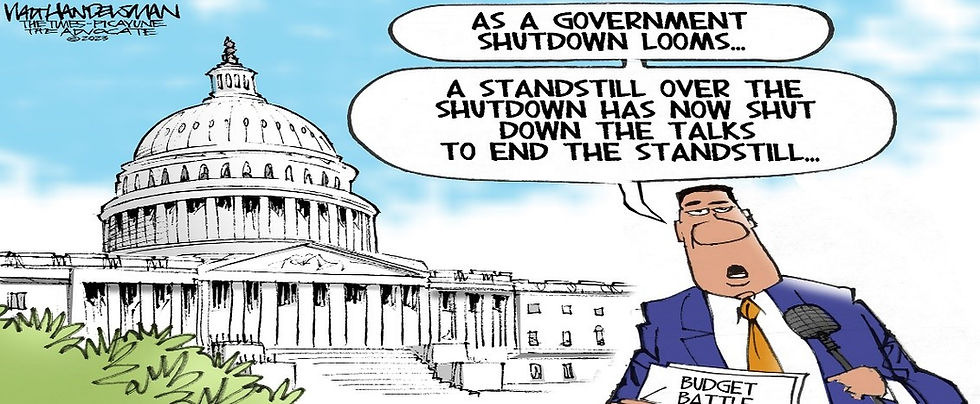How a Government Shutdown Affects Healthcare
- dmeruneightinc
- Oct 3
- 3 min read

What Patients and Providers Need to Know
While the news often focuses on federal employees and politics, healthcare patients and providers across the country also feel the strain. When the federal government shuts down, the ripple effects reach far beyond Washington, affecting Medicare, Medicaid, Tricare, Humana Military, and the VA. This blog is designed to give both patients and healthcare providers a clear, practical understanding of what to expect if a shutdown drags on.
Medicare and Medicaid
What Patients Need to Know
Your coverage continues. Medicare and Medicaid benefits don’t stop. If you’re already enrolled, your doctor and pharmacy can still bill the program.
Expect delays in paperwork. New enrollments, replacement cards, and appeals may take longer to process.
Customer service may be limited. Helplines could have longer wait times, and online systems may update more slowly.
What Providers Should Expect
Claims are paid. Medicare and Medicaid will keep reimbursing providers for services already covered.
Administrative delays. Audits, certifications, and inspections may be put on hold, which can slow down new projects or program participation.
Strain on safety-net programs. Community health centers and other facilities that rely on discretionary federal funds may face tighter budgets.
Tricare and Humana Military
What Patients Need to Know
Care is still covered. You can still see doctors, fill prescriptions, and go to the ER if needed.
Slower authorizations. Referrals to specialists or pre-approvals for certain services may take longer.
Pharmacy refills could be delayed. Mail-order and retail pharmacy authorizations may run slower than usual.
What Providers Should Expect
Claims keep moving. Providers working through Humana Military should still get paid for covered care.
Credentialing delays. New providers may have to wait until the shutdown ends to be approved.
Backlog risks. Once operations resume fully, an influx of pending claims and authorizations could create delays.
Department of Veterans Affairs (VA)
What Patients Need to Know
VA hospitals and clinics stay open. Most VA staff providing direct patient care are considered essential.
Disability and pension payments continue (for now). But if a shutdown drags on, future checks could be delayed.
Claims and appeals may stall. If you’re filing a new disability claim, appeal, or benefits request, expect longer wait times.
Community care may be disrupted. If you rely on outside providers through the VA’s Community Care Network, approvals and payments could slow down.
What Providers Should Expect
VA-employed clinicians keep working. Hospitals and clinics remain operational, though with thinner administrative support.
Outside providers face payment delays. Those seeing veterans through VA referral programs could wait longer for reimbursement.
Research and contracts pause. Grants, new initiatives, and expansion projects often freeze until the shutdown ends.
Shared Effects Across All Programs
Regardless of whether you’re on Medicare, Medicaid, Tricare, or VA care, shutdowns bring common challenges:
Paperwork delays. From benefit renewals to new ID cards, expect slower processing.
Customer service strain. Longer hold times and fewer support staff may make it harder to get help.
Confusion and stress. Many people worry about losing coverage — while core benefits continue, misinformation and uncertainty cause added anxiety.
Provider strain. Hospitals, clinics, and pharmacies may face reimbursement delays, forcing them to tighten budgets.
Tips for Patients
Refill medications early. Don’t wait until the last day; pharmacies may face approval delays.
Keep documents handy. Bring your insurance card, prior authorizations, and medication lists to appointments.
Use urgent/emergency care if needed. All programs continue to cover emergencies.
Stay informed. Check Medicare.gov, Tricare.mil, VA.gov, or your state Medicaid site for real-time updates.
Tips for Providers
Plan for slower reimbursements. Build in cash flow cushions where possible.
Communicate with patients. Reassure them that coverage continues and guide them on handling delays.
Track authorizations and claims. Anticipate backlogs and follow up proactively.
Advocate. Contact associations, policymakers, and administrators to highlight the effects on your patients.
Final Thoughts
A government shutdown doesn’t mean healthcare stops — but it does create ripple effects that touch nearly every corner of the system. Patients can still get care, fill prescriptions, and use their coverage, but they should prepare for paperwork delays, slower customer service, and possible confusion. Providers will keep seeing claims paid, but new certifications, authorizations, and discretionary programs may stall, straining operations. Veterans, service members, and families face added uncertainty with VA and Tricare programs, which are more sensitive to federal funding delays. Shutdowns may be temporary, but the backlogs and disruptions they cause can last long after government funding is restored. By staying informed and planning ahead, both patients and providers can weather the storm while continuing to prioritize care.
_edited_edited_edited_edited_edited.png)




Comments